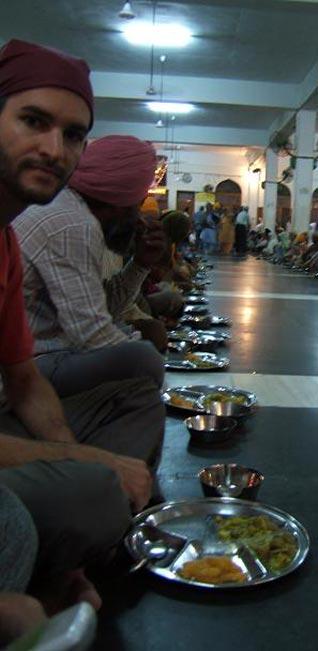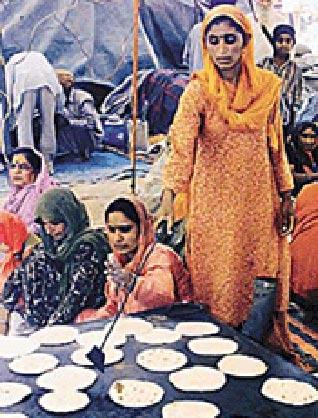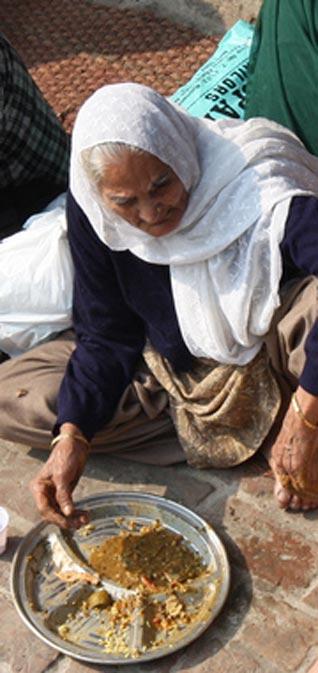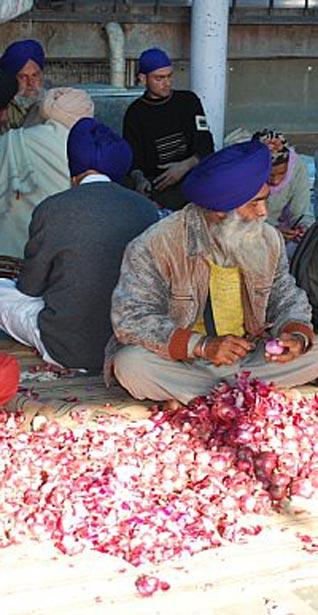Resource Library
Langar, The Sikh Refectory
Part Two
The Temple of Bread
by PARKASH SINGH
This is Part Two in the sikhchic.com series on the history and development of the Langar. Written by a scholar who once also served as the Information Officer at the Darbar Sahib in Amritsar, this week he continues with the philosophical underpinnings of Langar, before he takes us on a journey which reveals how each Guru helped shape this central pillar of Sikhi as we know it today.
Gurdwaras are not only places of worship but also training centres for service. Chores such as sweeping the precincts, serving drinking water to the thirsty and food to the hungry, fanning the congregation in hot weather, have always formed an integral part of the functions in a Sikh shrine.
Of these, langar is perhaps the most important. A gurdwara without a free kitchen is inconceivable.
In its very inception - a protest against the inequities of the caste system - the Sikh langar is a ‘common refectory' attached to every gurdwara. Guru Nanak had started a crusade against the tyrannies of the 'high-born' over the people of humble origin; and the Guru's langar was an institution which was promulgated in this holy campaign.
A practical step to root out the evil which was eating into the very vitals of the people of the Indian subcontinent, the free kitchen became the foundation of equality and fraternity among the followers of the Guru.
If one studied aright the ideals of Sikhism, one would be simply impressed by a really unique feature: the secularization of service. And this ideal is most vividly practised in the Guru's free kitchen which is open to all. Those who profess other faiths are as freely allowed to partake of and help in the running of the kitchen as the followers of the Sikh faith themselves. No distinction is made between man and man, between Sikhs and non-Sikhs, between the 'high' caste and the 'low', in seating or serving the food in the Guru's kitchen.
"Men and women of God, wherever they are, of whatever race or creed, belong to one community - the Community of Man - and are free from the chains of birth, creed and race."
The Sikh Gurus exhorted their followers to regard every one as their own brother or sister. We are children born of the same Father. "Our Father is One and we are all his children" [‘ek pita ekas ke hum barik ...' Guru Arjan.] Thus we are all members of one family.
All the Gurus showed in actual life how this precept of the "Brotherhood of Man" was to be lived out; and the free kitchen is perhaps the best demonstration of this. Love and active sympathy for the down-trodden, to lift and embrace the fallen, and to share our earnings with the needy and the poor are some of the factors of a true religion.
And the free kitchen is an institution where these noble ideals can be practised. A gurdwara is a central place of worship and langar is a place for serving each other. In langar, a mingling of all classes is provided and in dining together comes realization of the truth: "All food is a gift from God and that prejudices about it are entirely invalid."
A Sikh repeats these words every day in his prayer:
"Utter Waheguru and meditate on the deeds of those who recite the Name and share their earnings with others" [‘jinnah naam juppya, wund chhakya ...' Ardaas.]
No wonder: "Bread and water belong to the Lord - and the desire to serve, the pleasure of Sikhs!" is the popular chant oft sung in chorus by the Guru's disciples as they serve in the free kitchen. [‘unn paani Guru ka, tehl bhaavna Sikhaa(n) da!']
* * * * *
Langar, in short, helps in teaching service, spreading equality, removing untouchability - another curse of India's caste system - and such other evils and prejudices as spring from social and racial distinctions.
The institution of langar is as old as Sikhism. It was started by Nanak and carried on by his successors. Guru Nanak declared that every Sikh house should be sacch dharamsaal - 'a place of open-hearted charity, truth and devotion.'
In the words of Bhai Gurdas. "Wherever the holy feet of Guru Nanak touched, dharamsaals were erected,' which were at once the houses of charity as well as devotion. [‘jithey Baba pair dharey pooja aasan thaapan so-aa ...' Vaar 1:27]
In a way, the kitchen in every Sikh's house is a Guru-ka-langar, as he is enjoined to share his food with others.
The poet-mystic Puran Singh rightly observes in The Book of The Ten Masters (p141): "Today no Sikh with a grain of faith in him can possibly think that he owns the Bread."
Langar in a gurdwara is the community kitchen. Every Sikh is expected to take part in the running of the kitchen. He may pay for the expenses, bring provisions or personally contribute 'labour of love' by cleaning utensils, fetching water or fuel, or taking a hand in cooking and distributing food.
Puran Singh calls the Guru's Langar the "Temple of Bread" and says:
"What is a home but a hospitable feasting of children with bread and love and faith? What is spiritual life in the temple of flesh without a full meal first? The very first temple made by Guru Nanak, therefore, was the Temple of Bread, or Guru's Langar. In one common Temple of Bread, the bread of God was made free to the children of man. Let none be hungry where the spirit of God prevails. The Guru's people and the Guru were one home and one family; but it was no utopian idea, as of the modern socialism or the democracy of labour; it was the democracy of the soul, so gloriously invoked in the temple of the human heart by the genius of the Guru." [Ibid, p142]
Continues next week ... Part III: "Sangat and Pangat"
January 24, 2011






